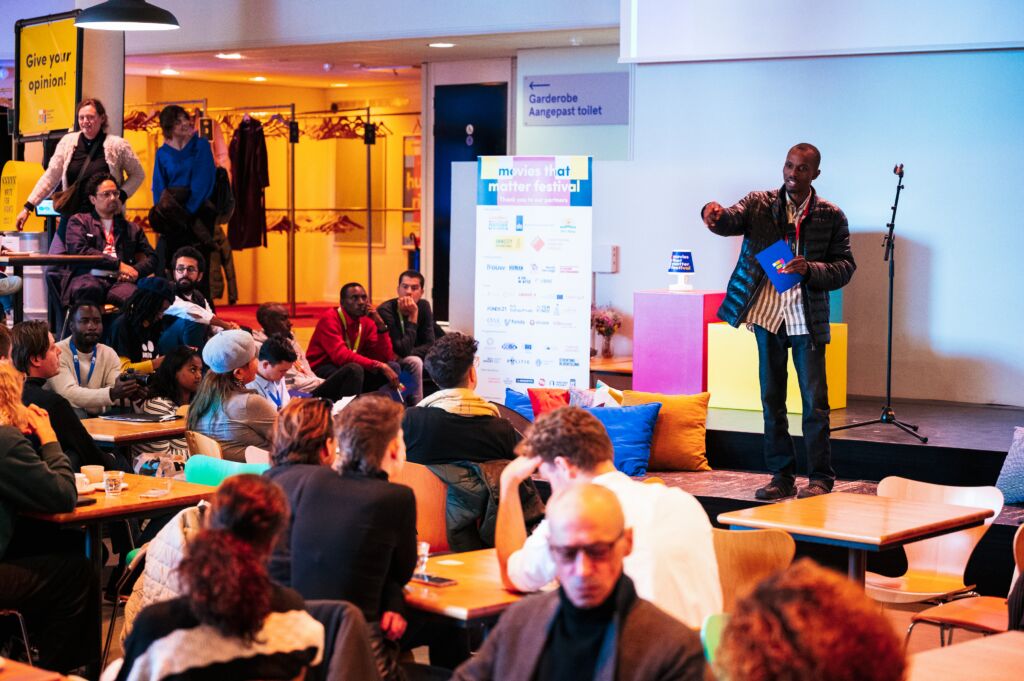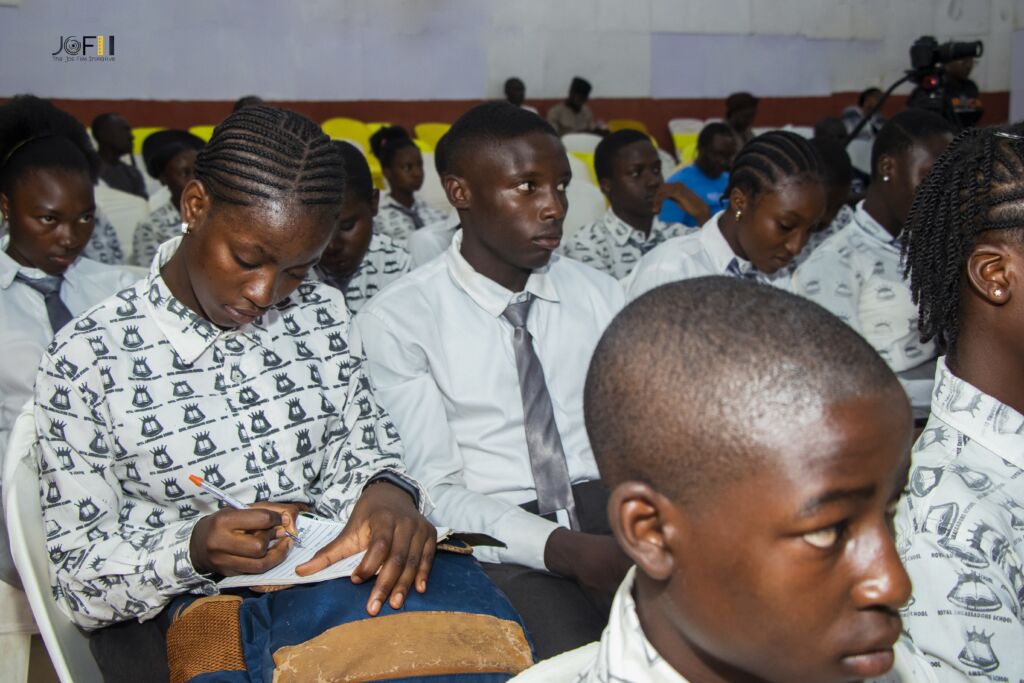Inspiring Nigeria’s youth
At our festival, we met with Henry Samson Mafulul, director of the Rock International Film Festival (RIFF) and a participant of the Cinema without Borders workshop programme. In this interview, Henry shares how RIFF uses film screenings to encourage young people in Nigeria to advocate for human rights. 04 July, 2024
Rock International Film Festival (RIFF) is a four-day annual film festival taking place every November in the city of Jos in Nigeria. As a human rights film festival, they are dedicated to educating local people on fundamental human rights and raising awareness about various forms of human rights abuses. During the festival, numerous films which address human rights issues are screened coupled with discussions or Q&As. In this way, RIFF seeks to inspire constructive dialogue and to ignite activism, ultimately prompting tangible action against human rights violations and abuses.
Henry Samson Mafulul is the driving force behind RIFF. With a deep-seated passion for human rights advocacy, coupled with a profound belief in the power of cinema, Henry created the festival in 2022. Henry’s vision for the festival was rooted in the realities of his homeland. Nigeria, like many countries, grapples with systemic human rights violations, ranging from police brutality to gender-based violence. He saw cinema as a potent tool for raising awareness and empowering communities to demand change. Particularly significant is RIFF’s dedication to inspire the younger generation to become human rights advocates, using cinema as a medium for education and empowerment.

Let’s take it to schools and see how we can help
RIFF has a profound focus on engaging young people as its primary audience. In Jos, students and young adults make up more than half the population. Yet, awareness and comprehension of human rights remain alarmingly low, especially among the youth. Instances like arbitrary police searches and detentions highlight the everyday challenges faced by individuals, which underscore the necessity for greater consciousness and advocacy.
By targeting young people, RIFF aims not only to educate and empower them but also to cultivate a generation that challenges the status quo and advocates for change. With a vision for the nation’s prosperity and the future in mind, cultivating this comprehension to the youth becomes paramount. By instilling a sense of activism and awareness in today’s young minds, RIFF endeavors to create a ripple effect, inspiring them to become catalysts for positive transformation in their communities and beyond.
It is also in this frame of mind that, for the future, RIFF hopes to set up educational programmes for secondary schools. RIFF has already worked at schools in collaboration with various NGOs, who saw the festival’s inspiring work and wanted to work together to bring discussions regarding human rights issues to schools. There, they saw the impact that film can have on children first-hand.
One particular instance that Henry recalled was a screening they did of a movie about sexual violence and arranged marriage at a school. After the screening, they discussed the movie and one of the questions concerned whether the students had any experiences of their own with those issues. The number of students who opened up about their experiences was astonishing. Henry:
Film is thus such an effective tool that most kids begin to open up about difficult topics. Film screenings and workshops can give young people a voice to stand up against human rights abuses.
Therefore, RIFF wants to continue this inspiring work, and an initiative to take its human rights advocacy directly to secondary schools is already on its way, titled ‘RIFF goes to schools’. By screening movies and engaging in dialogue with students, the initiative aims to spark interest and provoke thought in young people, through workshops like screenwriting for social change. In that way, young people can stand at the forefront of the festival’s mission to promote human rights consciousness and pave the way for a brighter future.

Movies that Matter gave us the opportunity to be independent
While the vision for RIFF had long been in the works, getting the funding to realise the festival remained a difficult task. The start-up grant provided by Movies that Matter however, was able to give the final push through which the festival could be turned into a reality. As Henry states, ‘that is one of the exciting things about Movies that Matter, that they can support your first-time film festival.’
Aside from the financial assistance, Movies that Matter’s support has also led to increased attention from other organisations that are possibly interested in collaborating with the festival, including the Dutch and French embassy in Nigeria as well as Amnesty International. But most importantly, Henry states that the support of Movies that Matter has empowered them to uphold their platform independently. Henry: ‘Movies that Matter has given us a platform, an opportunity to have a platform that has given us independence. Nobody tells us what to do. We do what our vision and our mission is directing us to do.’ This independence was essential to maintaining RIFF’s unwavering commitment to human rights.
The existence of RIFF has also prompted other festivals in Jos to align themselves with human rights themes. The transformation was palpable, with established festivals redefining their agendas to spotlight human rights issues, which is the most important. ‘We need to keep raising awareness about human rights, especially in my country, it is very important,’ Henry emphasizes.
RIFF stands as a testament to the profound impact film festivals can have to drive social change. Through its unwavering commitment to human rights advocacy and community engagement, the festival serves as a beacon of hope in the pursuit of a more equitable world. As Henry and his team continue to inspire and empower, they remind us of the enduring power of cinema to raise awareness about injustice and catalyze meaningful action.
The International Support team is committed globally by financially supporting human rights film festivals (Grant Programme), film screenings at embassies (Embassy Film Menu), a programme for activists (Activist Programme), coordinating a partnership between festivals (Human Rights Film Network) and workshop programmes for film festival organisers (Cinema without Borders).